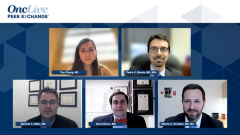
Ongoing Clinical Trials in the Adjuvant Setting in RCC
Dr Bilen reviews some ongoing trials looking into monotherapy and combination therapies in the adjuvant setting in RCC.
Episodes in this series

Tian Zhang, MD: Dr Bilen, can you also tell us, briefly review how ongoing trials are still in play for this particular adjuvant landscape, and in particular, the IMmotion010, the CheckMate 914, and the RAMPART trials?
Mehmet A. Bilen, MD: Yes, definitely. I think just like how our job is getting more and more complicated in the first-line metastatic setting, the adjuvant setting is going to get very active in the near future. I think in these 3 important trials, we are going to get results soon. The first one, the IMmotion010 trial, this is similar to the KEYNOTE trial we discussed earlier, comparing adjuvant atezolizumab versus placebo for 1 year. And the primary end point for this trial is progression-free survival. This study is fully enrolled, and I think we are going to get results soon. Hopefully this trial will read out soon. The second trial is bringing CTLA-4 to the combination; the CheckMate 914 trial is comparing nivolumab plus ipilimumab versus nivolumab versus placebo. Again, this study is also enrolling patients with clear cell histology, and the primary end point is progression-free survival. Last but not least is the RAMPART trial. This is another PD-1, CTLA-4 in the adjuvant space. The drugs in this trial are durvalumab plus tremelimumab, which is a PD-1, CTLA-4, versus durvalumab versus placebo. I think one thing that is different for this trial is including the non–clear cell histology, which is important. They have a coprimary end point, which is progression-free survival and overall survival. Hopefully, soon we are going to get some more data in the adjuvant space.
Tian Zhang, MD: Wonderful. Yes, I agree. These 3 trials are all very exciting and can help us understand this adjuvant space a bit more. Dr Bilen, in terms of thinking about these adjuvant treatments, which factors are influencing your choices of combinations versus monotherapy pembrolizumab?
Mehmet A. Bilen, MD: That is another very important thing that soon we will need to answer in the clinic. I think most of us want to see the data and want to look at the efficacy, not only progression-free survival, but also overall survival, because at the end of the day, I think this is very important for this patient population. We really want to cure them in addition to delay their recurrence. Another important thing is toxicity. I think in particular toxicity is even more important for the adjuvant space because they are not having any adverse effect or symptom from the disease itself, and whatever adverse effect they are going to see is from the drug itself. We want to make sure that we don’t see any excessive toxicity that’s going to affect our patient. But overall, if you want to cure someone, I think this is the opportunity. I think for patients with very high risk, we may want to choose a doublet rather than a single agent. And those at very high risk after nephrectomy, and 1 mastectomy based on the KEYNOTE trial, I think we see more benefit in the subgroup. Also, patients with sarcomatoid histology, where we know they have a higher chance for recurrence. Maybe in those populations we may want to choose IO [immunotherapy]/IO adjuvant therapy, but let’s see the data and hopefully, we are going to have a final consensus.
Tian Zhang, MD: Yes, wonderful. Thanks for that.
This transcript has been edited for clarity.





































